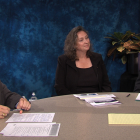
Well-being of Children Central to Courts’ Mission, Expert Panel Says
|
The nation’s juvenile and family courts need to lower walls that have blocked the sharing of data that is key for to marshaling a child through state agencies and the justice system, according to a gathering of court experts Thursday. If the courts fail, a child’s mental, physical and emotional well-being could be damaged, according to a series of measures and recommendations put forth by the panel to guide judges and courts in handling youth in the system. “The days of sitting in your office creating your own [data] system without input from others – those days are gone,” said Sandra Moore, head of Pennsylvania’s Office of Children and Families in the Court. “We just can’t function that way anymore…The court system needs to be able to talk to the child welfare system.”
Courts Have Had Some Success
Over the years, judges and the courts have had success pushing forward the conversation on the safety of state wards and foster children, as well as dealing with matters like visitation and permanent placement, the panelists said. “The problem is, with well-being, frankly we weren’t sure how effective the courts would be,” said Gene Flango, executive director at the National Center for State Courts.
